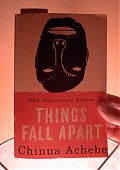
Chinua Achebe
Things Fall Apart
Written in 1958, Things Fall Apart was a direct response to the predominately white-colonist view of tribal Africa, in literature and unfortunately, everywhere. Chinua Achebe wrote his first novel, this novel, in the tongue of the colonists, yet it was written from the insides of tribal life. Things Fall Apart is a stunning book; a book which seems to prove why books are written.
Though Achebe wrote in English, his language is the language of tribes who uphold the traditions of oral storytelling. They are simple and layered with complexity of meaning. Achebe’s words seem to be the rare poetics of near perfection, accomplishing what they were summoned to accomplish. The reader is drawn to the dusty African earth, and though I had never tried to imagine tribal life, I now feel as if I’ve nearly been there.
Things Fall Apart is divided in two. Part One is mostly concerned with describing the Igbo village of Umuofia, through Okonkwo and his family. Okonkwo was a strong man, a self-made man, a man driven by the fear of resembling his lazy and effeminate father (read: artist). Okonkwo beat his wives and children and he worked and he took part in the major decisions of the tribe.
Perhaps down in his heart Okonkwo was not a cruel man. But his whole life was dominated by fear, the fear of failure and weakness. It was deeper and more intimate than the fear of evil and capricious gods and of magic, the fear of the forest, and of the forces of nature, malevolent, red in tooth and claw.
But beatings were quite common in Umuofia and beyond, as was the practice of multiple wives, the summoning of spirits and the keeping away of maladies and other rituals which reveal a great reverence for nature. I never thought of these men as heathen, for the beauty of this book is the strength of its context.
Nature ruled the tribe supreme, and deities were named for the forces. Even sacrifices have a purpose when nature is the cruel blueprint for what we choose to worship. For people who work the land, depend on the land, feast or famine, seem to be born from the land and die into it, there are few more mighty or majestic (see above quote). Patterns are discerned through the chaos and stories are told about them.
Enter Christian white men. Their sadistic lust for domination and conversion kicks the ancient harmony of Okonkwo and his forefathers out the window.
The white man is very clever. He came quietly and peaceably with his religion. We were amused at his foolishness and allowed him to stay. Now he has won our brothers, and our clan can no longer act like one. He has put a knife on the things that held us together and we have fallen apart.
I don’t want to write more about this book for I came to it in ignorance and found that to be part of its pleasure. In some ways, the power of Things Fall Apart reminded me of The Ice Palace by Tarjei Vesaas, another short book of fine language. Though Norway and Nigeria seem worlds apart, it is books like these that close the distances of humanity.
· · · · · · · · · · · · · · · · · · · ·